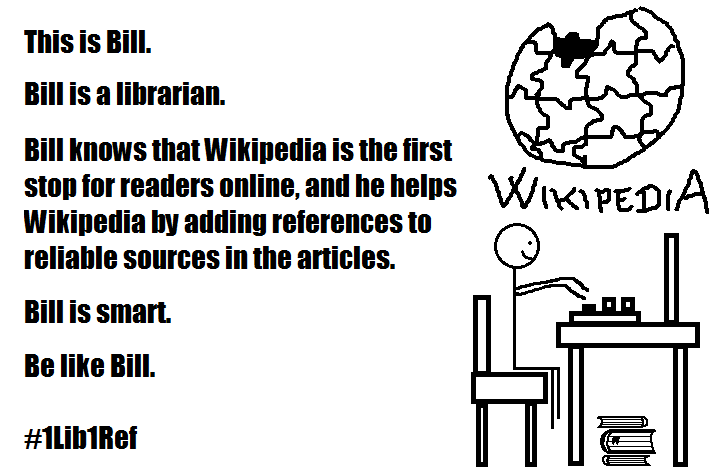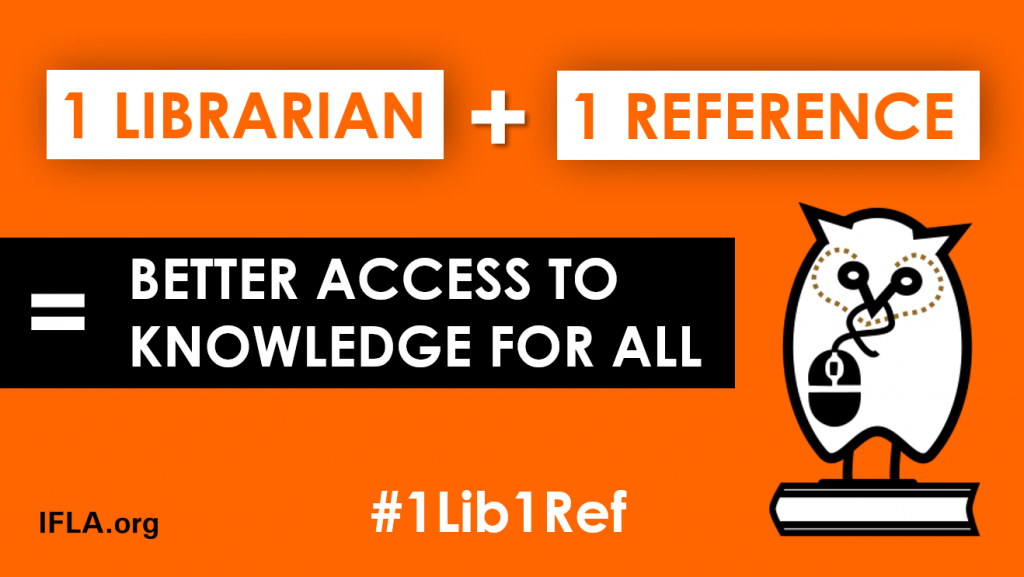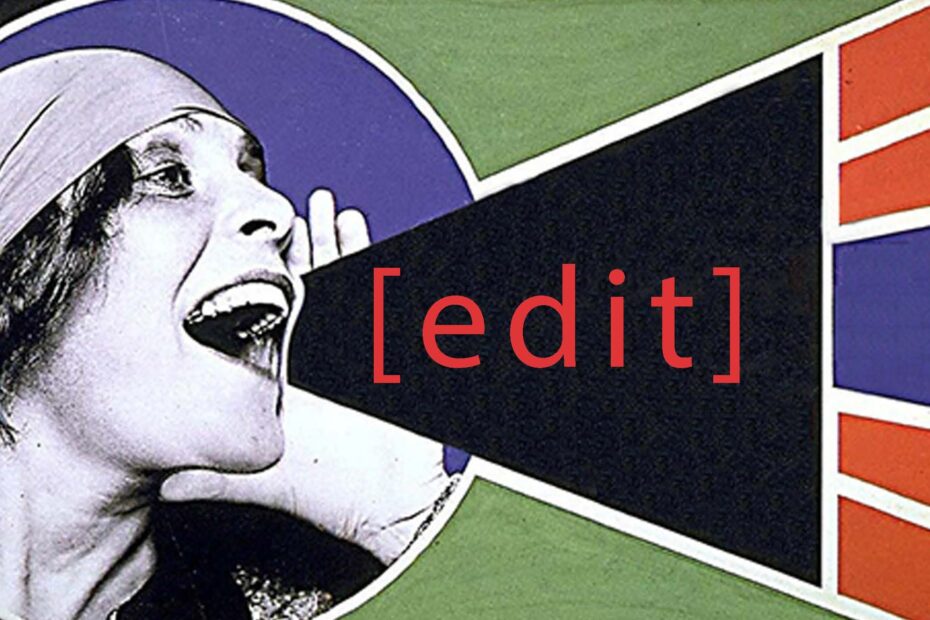This post was originally published as an assignment for INFO 200 Information Communities at the School of Information at San José State University.
In my previous post, I mentioned some ways in which libraries can play a role in connecting Wikipedians to their communities. This improves the representation of diverse groups in the content found on Wikipedia. Libraries and Wikipedia share the same values, free open access to information. Wikipedians are a global information community and libraries play a critical role in meeting their needs. There are several groups that collaborate with libraries to make Wikipedia more representational of our global community. Both in terms of diversity and information accuracy.

A variant of the “Be like Bill” meme for the #1Lib1Ref initiative.)
The Wikipedia Library Team
The Wikipedia Library is an open research hub where Wikipedians can access the resources they need to do their work. This global project is made up of Wikimedia Foundation staff and volunteers from around the world. The Wikimedia Library Card Platform gives Wikipedians access to online databases normally locked behind paywalls or only available to library cardholders at their local libraries or colleges. This opens up access to research tools that may otherwise not be available to some global communities. In further support of underserved global communities, the team provides instructions for creating a virtual library branch and the tools for outreach and engagement within local communities.
Twice a year Wikipedia Library Team also hosts #1Lib1Ref, which is an ongoing campaign calling upon librarians around the world to add at least one missing reference to Wikipedia. Because Wikipedia is often the first place people seek information online, the goal of this campaign is to improve the accuracy of the content on Wikipedia. They invite anyone who has an interest in making information on the internet reliable. This group also presents the #1Lib1Ref campaign to future Wikipedians at the International Federation of Library Associations (IFLA) annual conferences.
At the 2016 World Library and Information Conference in Columbus Ohio, members of Wikimedia Library and GLAM-Wiki (Galleries, Libraries, Archives, and Museums) presented some crowdsourcing ideas that global libraries can use in their communities. After their initial presentation, this team then collaborated with an international pool of librarians to create a series of whitepapers. These list resources, skills, tools, and models for instruction to be freely shared in support of Wikipedian crowdsourcing and community engagement for public and academic libraries (Stinson & Brungs, 2016).
- Opportunities for Public Libraries and Wikipedia
- Opportunities for Academic and Research Libraries and Wikipedia
The #1Lib1Ref campaign’s purpose seems more relevant than ever. The COVID-19 global pandemic has forced library buildings to close and move services online. Yet at this time, people need access to information more than ever. Isolated, they turn to the internet for their research. This can be seen by the exponential growth in Wikipedia’s page views over the course of the year 2020. This presents an excellent and much-needed opportunity for libraries and Wikipedia to enhance their relationship. In response to the pandemic, some publishers have opened access to their materials by dropping their paywalls. But these measures are temporary. Access to information now further demonstrates the need for free reference resources like Wikipedia (Stinson, 2020).

retrieved from IFLA.org
The Wikipedia Community
A list of several ongoing editing projects can be found on the Wikipedia Community Portal. These are an open call to the global community to participate in improving the site’s content. Each of the projects presents the need for Wikipedians, but also offer excellent opportunities for information professionals in public and academic libraries make significant contributions to the information needs of their patrons and the greater global community.
- The World 100,000 Challenge is a quest for the global community to make one hundred thousand article improvements or entries on Wikipedia. The challenge is broken up into a series of individual countries’ pages to maintain and monitor.
- The AfroCine Project asks for contributions of articles, images, videos that show historical and contemporary African cinema. Their mission is to close the content gap and to improve the biases of the African Continent.
- WikiProject Spoken Wikipedia seeks to capture recordings of readings of Wikipedia articles to make the site’s content accessible to the visually impaired. And they seek native and fluent speakers to support Wikipedia’s multilingual audience.
- Women in Red: #1day1woman | 2020 is a monthly global edit-a-thon focus on adding and editing articles about women.
- GLAM-Wiki Projects asks Galleries, Libraries, Archives, and Museums around the world to share their content on Wikipedia. By doing so, these intuitions will have global reach and can share their expertise and knowledge with the world.
In his 2019 blog post “A Million Stories”, Christian Lauersen says that libraries connect the people of the world, but they also have “an obligation to foster social justices and help communities fight inequality and polarization” (Lauersen, 2019). Projects such as Lauersen’s “A Million Stories”, provide a great example of how libraries in four separate countries come together to record stories of refugees. These stories are now preserved on a web-based platform that can be shared and viewed worldwide. I think projects such as this can partner with Wikipedians to take advantage of Wikipedia’s position as one of the most accessed reference sources. This would expand their reach and impact on a global scale.
References
Lauersen, C. (2019, August 7). A million stories – how libraries can foster integration of refugees through culture and storytelling. The Library Lab. https://christianlauersen.net/2019/08/07/a-million-stories-how-libraries-foster-integration-of-refugees-through-culture-and-storytelling/
Stinson, A. (2020, May 14). On the frontlines of an infodemic, wikipedians and librarians join forces. Medium. https://medium.com/freely-sharing-the-sum-of-all-knowledge/covid19-infodemic-wikipedians-librarians-1lib1ref-8d2918ed4f06
Stinson, A., & Brungs, J. (2016, September 20). IFLA — engaging the world’s libraries with wikipedia—what are the opportunities? International Federation of Library Associations and Institutions (IFLA). https://www.ifla.org/node/10871
